Mathieu Kassovitz Rebellion Interview
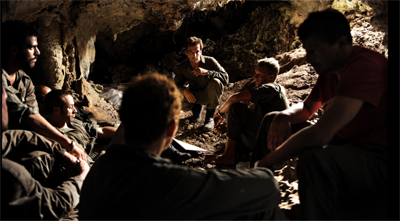
Mathieu Kassovitz Rebellion Interview
Cast: Mathieu Kassovitz, Iabe Lapacas, Malik Zidi
Director: Mathieu Kassovitz
Genre: Action, Drama, History
Running Time: 129 minutes
Synopsis: April 1988, Ouvéa Island in the French colony of New Caledonia. 30 policemen are kidnapped by Kanak separatists.
300 French special-forces operatives are sent to restore order.
Two men face off: Philippe Legorjus, captain of the GIGN, an elite counter-terrorism police unit, and Alphonse Dianou, the rebels' leader.
They attempt to find a peaceful solution based on common values and dialogue.
But, against the backdrop of presidential elections in France, the political stakes are high, and order is not necessarily a moral question.
With this violent and troubling saga based on real-life events, Mathieu Kassovitz makes a powerful comeback in front of and behind the camera.
Release Date: April 12th, 2012
Website: www.lordreetlamorale-lefilm.com
Interview with Mathieu Kassovitz
Question: How did you come to take an interest in the events in Ouvéa and the character of Philippe Legorjus?
Mathieu Kassovitz: Thirteen years ago, my father gave me the League of Human Rights' Report on Ouvéa to read. It gave a minute-by-minute account of what happened. Of course, I had some recollection of events-I was eighteen at the time. I remembered the version given on TV: native Kanaks had massacred some policemen with machetes and taken others hostage. There had been decapitations and rape... I remembered what Chirac, who was Prime Minister at the time, had said: that these were human beings who deserved to be treated as such. In the book, I discovered a completely different story. The report claimed there had been atrocities and summary executions that had left 19 Kanaks dead. Telling the story of those ten days in April-May 1988, the report was a full-on screenplay. Throughout its incredible story, one character recurred constantly at every level: Captain Legorjus, a GIGN officer sent to negotiate with the hostage-takers, who found his hands tied by politicians and the military. The kidnappings took place during the presidential election campaign, which pitted François Mitterrand against his Prime Minister Jacques Chirac. Some time later, when I was shooting Crimson Rivers, I went swimming with one of the actors, Olivier Rousset, who told me that for six months in 1989 he'd lived in New Caledonia, on Ouvéa Island with people who'd directly experienced the events of 1988. He'd been accepted by the locals and had fallen in love with the country and its inhabitants. Since then, he'd been back several times. I asked him to organise a trip there so I could meet the Kanaks. 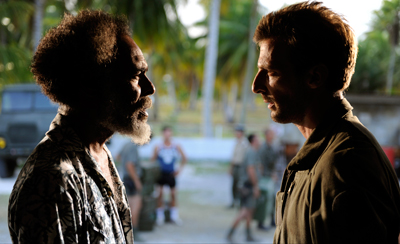 Question: Did you go with the film in mind?
Question: Did you go with the film in mind?
Mathieu Kassovitz: Yes. I knew there was the material for a wonderful movie and the script was virtually written. The dramatic structure was in the report of those ten days. On that first trip, we didn't talk about the movie. We just took a look round, to see who I was dealing with. I was wondering if I could a get a project like that off the ground and if it was possible to make it over there. Ten years had passed but people were still withdrawn into their grief. The subject was taboo. There had been no closure. There was a lot of religious and political in-fighting within the Kanak community. The nineteen dead men came from tribes and families that are all linked together in one way or another. Olivier introduced me to Mathias Waneux (a Kanak tribal chief, and business and political leader) who also has a part in the movie. We lived at his place when we were over there. He talked us through the "custom" and pleaded our case with the various factions. Mathias warned us that it may be too soon and that we'd most likely have to wait another ten years before being able to make the film. I spent ten days exploring the country and meeting the people. When I got home, I started work on the script. In the next five years, I went back on several occasions partly for research purposes and partly to sound people out about making a movie. Every time we had to go through the ritual at the heart of Kanak culture, the "custom."
Question: How would you define the "custom"?
Mathieu Kassovitz: The custom is a discussion that ends in tacit agreement, which must not be broken because it is made eye-to-eye. Kanak society is based on a person's word, which has great value and is an absolute commitment, while lending a sacred dimension to all things. In New Caledonia, everything hinges on the custom. The discussions are very interesting-I've never encountered anything like it anywhere else-and they can go on for hours or even days. There's a time to speak, a time to listen and a time for the decision. We went through the whole process with Olivier. They said, "You can make this film if everybody agrees." We asked what they meant by "everybody." "All the victims' families," they replied. "And anybody who is in the custom and is entitled to his or her say." As a result, we often found ourselves explaining what we wanted to do and why to forty or more people. What complicated matters for me from the outset was that I wanted to tell the story from the point of view of Philippe Legorjus, whom many Kanaks believe betrayed them precisely because he didn't-or couldn't-keep his word.
Question: Why were you so determined to tell it from Legorjus's viewpoint?
Mathieu Kassovitz: Because he's the thread running through the whole story. Because it was an arduous, surprising and very powerful life-experience for him. At the time, I hadn't met him, but I'd read his book, La morale et l'action ("Morality and Action"), which gives a clear picture of all he went through-how a relationship of trust was forged between him and the rebels' leader, Alphonse Dianou, and how he had to betray it in spite of himself. It's Shakespeare! Moreover, his point of view was easier for me to explain, if not defend. I'm not Kanak, I'm not here to defend the Kanaks' cause, but to express a point of view that mainstream audiences can understand-the story of a white man who could be the guy-next-door and who encounters other people from another culture and experiences something very powerful. It's only through Legorjus's eyes that we could set out the political and human dilemma. I explained that to the Kanaks during the custom and they replied, "Sure, but he's a traitor." I told them the point of the movie wasn't to portray him as a hero-or a traitor, actually-but to tell the story of what he went through. During the customs, we found ourselves in some pretty tense situations, but everything always turned out okay because we were talking. We were often confronted with people who were very wary of white men and mainland French people-young 25-year-olds who were 5 when their father or uncle was killed. They live with that memory, the image of their father or uncle sprawled on the ground with a bullet in his body. It's made even worse by the fact that nobody talks about it. There's a huge question mark over what truly happened, which simply spurs all kinds of fantastical theories. Some people rebuked us for opening up old wounds. We tried to explain that, on the contrary, it could be a way of helping those wounds to heal.
Question: Can you tell us what touches you most in this story?
Mathieu Kassovitz: The relationship that grows up between the GIGN officer and the young separatist leader, the encounter between two characters who are immediately on the same wavelength. They share the same aims and need for justice. The GIGN isn't a typical special-forces unit. These guys have their own philosophy and ethics. If a mission results in someone's death, they consider it a failure. Legorjus wanted to be a monk. In 1968, he battled with riot-control units he later joined.
Alphonse Dianou also wanted to be a priest. He studied theology for seven years and later committed himself to a struggle that he didn't necessarily want but completely embraced to the point of self-sacrifice. It's fascinating to be dealing with two such contradictory but similar characters. I asked Philippe if they'd become friends. He replied, "It wasn't friendship. It was fraternity." What touches me first and foremost is the human angle. And immediately after that, the terrible injustice of it all. In a world that's not even perfect, just normal, Legorjus would have been given the time to resolve the issue and nobody would have died. The political issues, which gradually emerged as I dug deeper into the story, are overwhelming. How politicians are prepared to sacrifice hostages if it serves their interests. How there is an obvious lack of respect, dialogue and, in a word, intelligence. It resonates with me because, to a lesser extent, it's exactly what's happening in the inner cities. Also, the story has a universal aspect that I find compelling. The way people's resources are pillaged while laws and rules are imposed on them that cannot work in their culture. And, beyond all that, there's the pressure, with the presidential elections at stake!
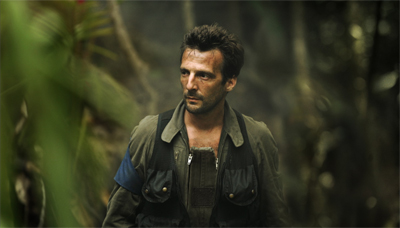 Question: What was the hardest part of the writing process?
Question: What was the hardest part of the writing process? Mathieu Kassovitz: Having two hours to tell the story of ten days that were extremely complex on almost every level-historical, cultural, social, military, political... Every scene matters, everything has to be perfectly understandable and there can be no shortcuts. The question is, how do you make it cinematic without over-dramatising or playing fast and loose with historical reality? How do you capture the essence of those ten days in a two-hour movie? That was the big challenge and it took us a long time. In the end I think I wrote something like 25 drafts! I wrote the first with a co-writer immediately after my first trip, but I soon realised we were on the wrong track. I started over, reminding myself we constantly needed to be with Legorjus because everything is seen through his eyes. Then I called in Benoît Jaubert, whose father was a soldier, to help me clarify the relationship between men from different corps of the military. And Serge Frydman lent a hand on the final drafts.
Question: You didn't involve Philippe Legorjus in the process?
Mathieu Kassovitz: No. In fact, I only met him once the project was well underway. But I soon gave him all the early drafts of the script to read. I needed his opinion on options we'd taken, and his corrections, to rectify any misapprehensions. I knew how much this story mattered to him. Those ten days marked his life forever. He's lived with the nightmare ever since. He started his life over shortly afterwards by resigning from his unit. If he was still a serving officer, it would have raised a few issues in my mind, but now it's impossible to have the slightest doubt about his sincerity, honesty and integrity. He has the greatest respect for his unit, but continues to abhor the cowardice of politicians. That surprised me, and also reassured me.
Question: Did you send the script to the Kanaks, too?
Mathieu Kassovitz: Yes, we followed the same process with the Kanaks. But then you arrive in a village where nobody has ever read a script and they all stop at the top of page two, which reads Legorjus wakes up at home, and say, "What are we doing in Legorjus's house?" You think to yourself that the fun's only just beginning. At the same time, crucially, it brought people together. Many Kanaks, for whom Mathias Waneux acted as a kind of spokesperson, needed to expiate the past and meet the families of the policemen. It's something they had to do themselves and they saw this project as an opportunity to meet them and Legorjus. He also needed to meet them and explain what he did. Not least in order for us to keep the project moving forward, it was essential that everybody talked so they could come to terms with their anxieties and lay their ghosts to rest. For five years, we worked like crazy on all kinds of levels.
Question: Did you plan to play Philippe Legorjus from the start?
Mathieu Kassovitz: No, I looked for other actors, but I soon realised that the movie was going to be long and hard to make. We constantly went from "Yes, we can" to "No, we can't." I couldn't hire an actor when I wasn't sure we'd ever actually shoot, with the obvious consequences for the film's funding. Above all, it soon became apparent that for all the people I was dealing with it was the best proof of my total commitment to the project. I wasn't keen to act in the movie because it was a tough shoot and I'd have been happier to stay behind the camera, but I soon realised that the picture would only come together, in funding terms and everything else, if I carried it from A to Z. It was important for everybody involved that I should play Legorjus. It gave my approach a stamp of authenticity.
Question: What was most complicated for you as an actor?
Mathieu Kassovitz: The real Legorjus is a professional, who doesn't let emotions get the better of him because they hamper your judgment. Before I met him, I pictured him as a much more romantic, cinegenic character, but his professionalism soon became the main axis of the movie for me both as director and actor. It allowed me to step back from his story and let history take over. Legorjus is simply our guide. Knowing that he'd never cried and almost never raises his voice gave me his angle and the film's rhythm. In fact, I had the same problem as actor and director-keeping a cool head. I knew I couldn't give into panic and, if things went wrong, I had to hold the line and keep the troops behind me.
Question: Besides you, Sylvie Testud, Philippe Torreton and Malik Zidi, there are few well-known faces in the cast.
Mathieu Kassovitz: My big problem was finding the right person to play Alphonse Dianou. I think there are only five Kanak actors listed in mainland France, and four of those were the wrong age for the part. We thought about casting African or Caribbean actors, but we soon ruled that out. We could shoot somewhere else, but we couldn't make the movie without Kanaks. I looked for "my" Alphonse in villages, in Nouméa, absolutely everywhere. Even then, I knew that as soon as I found him, he would be in a very tricky situation. Would he be entitled to play Alphonse if he wasn't part of the family? Would his tribe agree to it? Would his family agree to it? It wasn't just about finding a good actor. Then my casting director found Iabe Lapacas, a Kanak living in France and studying to be a lawyer, who also happens to be Alphonse Dianou's cousin. After asking his family, Iabe accepted the part, fully aware of what he was getting himself into. All I did was teach him the basics of acting-breathing, pitch, rhythm... The rest clicked into place. It was the same with Philippe de Jacquelin Dulphé, who plays General Vidal and is a genuine military man, a former colonel. He had something to say about what it means to be a soldier. When I considered my cast, I thought, "We'll have a Kanak who's never acted in a movie playing Alphonse, surrounded by about thirty other guys who've never been in a movie either. Who do I cast opposite them? Real actors? Well-known faces?" Instead, I went looking for ex-soldiers, foreign legionaries or guys from the GIGN, some of whom live out in the Pacific, and I threw them in with real actors, which kept everybody on their toes.
Question: Did you work with the GIGN?
Mathieu Kassovitz: No, the GIGN couldn't be directly involved in the movie, but we worked with former GIGN operatives who now work as movie consultants and took us on a week's training course, which helped the group bond and brought people's egos down a notch. Pretty much everybody got into it, and it wasn't easy because the shoot itself was quite tense. On one side, you had the guys playing the GIGN operatives and on the other the Kanaks whose relatives had been killed by various military units... There were a few edgy moments with people laying down the line, but it was a marvelous experience, with 150 extras sleeping in tents and coming to the set on bikes!
Question: Rebellion has a dramatic power and range, a cinematic sixth sense, that it's good to see you rediscover.
Mathieu Kassovitz: A cinematic sixth sense needs the subject to express itself. And the right production company-in this case, Nord-Ouest-which makes a huge difference to how a movie is made. Here, I agree, everything came together. Above all, I'm dealing with a subject that allows me to express something. At the start, when we were due to shoot in New Caledonia and the shooting budget was diminishing as other expenses grew, I talked to my DP Marc Koninckx, whose work on Johnny Mad Dog I loved, about shooting the movie with a handheld camera, documentary-style, without a real shot breakdown but with the camera at the heart of the action, a bit like Paul Greengrass' Bloody Sunday, which I adore. In the end, I kept that approach for the attack on the police station and the assault on the cave. But when we relocated the shoot away from New Caledonia, there wasn't the same pressure because we were on neutral ground, so I thought we could shoot a more poised, structured, directed movie, which is more my style. We chose to shoot in CinemaScope, which is a format that requires you to fill the frame, to compose the image. It also allows for the lyrical moments, the interludes in the action. At the same time, I tried to intrude as little as possible. We don't often change camera angle; characters are often filmed in profile.
Question: There are also moments of pure cinema. You mentioned the assault on the cave, where we're suddenly at the heart of the action, amid the danger and chaos, but there's also the flashback within a scene, as if Legorjus were actually witnessing the attack on the police station, which took place a few days earlier.
Mathieu Kassovitz: Yes, I allowed myself some directorial touches, but I didn't want to overdo it. It wasn't the right film for that. That flashback made the scene stronger, as if Legorjus was really witnessing events as they were being described to him. We turned the attack on the police station into a fairly sophisticated sequence shot. And after exploring various approaches for the final assault on the cave and testing different types of digital movie and stills cameras to be as mobile as possible, the DP convinced me to shoot that as a sequence shot, too, as far as our unit's advance was concerned. We rehearsed for a whole day on camera, then we shot full-on for two days, as if it were a real assault. In any case, I knew I only wanted to show the assault as Legorjus saw it. Once again, I had to stick to my decision to see things through his eyes. I couldn't show what was happening in the cave because Legorjus wasn't there. Also, there are a lot of different versions of those events. I'd have been forced to take sides and that wasn't what I was trying to do. Instead, I merely film the GIGN operatives moving forward, coming across Kanaks who have been killed by the commandos. Except the opening scene, which is a bit like a dream. A nightmare, in fact.
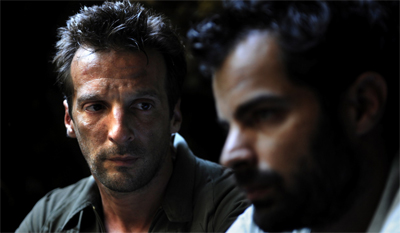 Question: This film sees you dealing with political issues again. Is that something you've missed in recent years?
Question: This film sees you dealing with political issues again. Is that something you've missed in recent years? Mathieu Kassovitz: I can't say I've missed it because I've been working on this project for ten years! If everything had gone to plan, I'd have made this movie in 2004. But when the project stalled, I had to find a film to make. First of all, Gothika came along, then Babylon A.D., which took five years to get off the ground. On top of that, I was offered some fine parts as an actor in Amen and Munich, which also deal with political issues.
Question: The title of Philippe Legorjus's book is Morality and Action and the original French title of your movie is Order and Morality...
Mathieu Kassovitz: For Philippe, "morality and action" sums up his life. They have been his guiding principles. "Order and morality" are the issues at the heart of the movie. Can they be reconciled? If so, how? The title works on several levels, from General Vidal's line when he says, "You will obey orders even if the contravene your personal morality" to the line I have Bernard Pons, the government minister, say, "We will restore order and morality." As if they were the same thing...
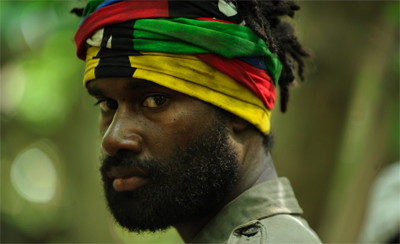 Question: In Rebellion, you use the music in a particular way, especially during the final sequences when it reinforces the dramatic aspect of the assault.
Question: In Rebellion, you use the music in a particular way, especially during the final sequences when it reinforces the dramatic aspect of the assault. Mathieu Kassovitz: Music in movies has always raised certain questions for me. I tend to be wary of directors who overuse music. It's so easy to manipulate audiences with it. In Café au Lait and La Haine, there's a little bit. For Assassin(s), I brought in Carter Burwell, who composed the scores of the early Coen brothers' movies. He wrote an absolutely superb score. I've always believed that if there is music it has to be totally justified and just right. When I was thinking of filming Rebellion documentary-style, I was inclined not to use any music at all. But when I decided on a more structured, composed style, I soon realised that I couldn't do without music. But there was no way I was going to lay violins over close-ups of Legorjus to ratchet up the emotion. Usually, I edit without music because it can force you into a rhythm that may not necessarily fit the movie, especially as you get used to it and it becomes hard to replace it afterwards. For this movie, I made an exception and I edited a few scenes to the music of The Thin Red Line. It worked really well, so I called Klaus Badlet, who had worked with Hans Zimmer on Terrence Malick's movie, and I talked to him about another film score I really liked-Full Metal Jacket, a slightly discordant military theme. I also mentioned another fantasy of mine as a director, which I try to make real as often as I can: using a theme in the last five or ten minutes that starts softly and crescendos to the end of the movie, like Ravel's Bolero or Carmina Burana. To make that surge of power even stronger and more dramatic, I didn't want classical instruments. We worked with the industrial percussion band Les Tambours du Bronx, who performed the score in their own way. That results in this very particular sound, like a military drumroll, but on metal crates so that it begins to sound like a rumbling tank.
MORE
- Mission: Impossible Fallout
- Glenn Close The Wife
- Allison Chhorn Stanley's Mouth Interview
- Benicio Del Toro Sicario: Day of the Soldado
- Dame Judi Dench Tea With The Dames
- Sandra Bullock Ocean's 8
- Chris Pratt Jurassic World: Fallen Kingdom
- Claudia Sangiorgi Dalimore and Michelle Grace...
- Rachel McAdams Disobedience Interview
- Sebastián Lelio and Alessandro Nivola...
- Perri Cummings Trench Interview



